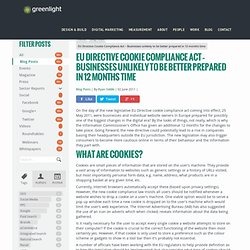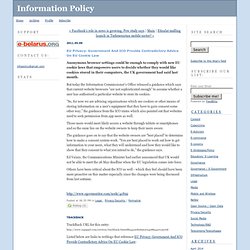

Joomla Web Design Norwich and Norfolk - Wintercorn - EU 'Cookies' Directive And Its Implications. Very soon a new EU law will come in to force requiring internet users' consent before cookies can be placed on their machines.

Under the European Privacy and Electronic Communications directive, UK-based businesses and other organisations running websites that track their users' cookies will be required by law to obtain "explicit consent" from visitors to their sites. Most cookie usage is for shopping carts and advert tracking but some sites use it to remember user preferences for login details, language, layout and other options on a site. The law is supposed to refer to tracking cookies but other cookie uses are not immediately clear. The Information Commissioner's Office hasn't yet drawn up guidelines for regulation so webmasters have a little time before the usual slavish enforcement of EU dictats begin. EU “Cookies” Directive. Interactive guide to 25th May and what it means for you. This blog is tracking you: cookies and EU regulation.
Greenlight > EU Directive Cookie Compliance Act – Businesses unlikely to be better prepared in 12 months time. EU Directive Cookie Compliance Act – Businesses unlikely to be better prepared in 12 months time Blog Posts | By Ryan Siddle | 02 June 2011 | On the day of the new legislative EU Directive cookie compliance act coming into effect, 25 May 2011, were businesses and individual website owners in Europe prepared for possibly one of the biggest changes in the digital era?

By the looks of things, not really, which is why the Information Commissioner's Office has given an additional 12 months for the changes to take place. Going forward, the new directive could potentially lead to a rise in companies basing their headquarters outside the EU jurisdiction. The new legislation may also trigger consumers to become more cautious online in terms of their behaviour and the information they part with.
What are cookies? Cookies are small pieces of information that are stored on the user's machine. Currently, internet browsers automatically accept these (based upon privacy settings). Source: Netcraft. Rob Manuel » Blog Archive » Meh to Cookie law. Chinwag - the UK's leading community media company for the new media industry. Update: Cookiepocalypse is over (possibly).

The ICO have updated their advice, suggesting implied consent is sufficient for users. Read more This one is going to run and run. I'm predicting that anyone in digital is going to be an expert in cookies by the end of the Summer. And not the nice baked versions either, sadly. Imagine a 90% drop in website visitors that are willing to accept a cookie from your website. be tracked through your analytics tool?
That's what happened with the Information Commissioner's Office (ICO) implemented the new law with existing technology, over 90% of site visitors declined to accept a Google Analytics cookie, thereby disappearing from their analytics. Whilst the powers-that-be have allowed a year for industry to figure out a way to implement the new 'daft by European standards' cookie law, its impact is dramatic, as illustrated by the graphs obtained by leading web analytics expert, Vicky Brock (@brockyvick), under a Freedom of Information (FOI) request.
EU Privacy: Government And ICO Provide Contradictory Advice On EU Cookie Law. Anonymous browser settings could be enough to comply with new EU cookie laws that empowers users to decide whether they would like cookies stored in their computers, the UK government had said last month.

But today the Information Commissioner's Office released a guidance which says that current website browsers "are not sophisticated enough" to assume whether a user has authorised a particular website to store its cookies. "So, for now we are advising organisations which use cookies or other means of storing information on a user's equipment that they have to gain consent some other way," the guidance from the ICO states which also pointed out that websites need to seek permission from app users as well. Those users would most likely access a website through tablets or smartphones and so the onus lies on the website owners to keep their users aware. Hey EU, Without Cookies, Children and Vulnerable People Are At Risk, Says Noesis Systems.
By disallowing the use of these cookies and forcing Internet users to opt in to get cookies while providing detailed instructions on how to remove them, these so called experts are potentially going to bring the Internet to its knees.

London, England (PRWeb UK) March 7, 2011 The latest amendment to the E-Privacy Directive (2002/58/EC) will have a huge impact on European websites. The new addition to the law deals with the use of cookies - small pieces of text stored on a user's computer by a web browser, - and consent on the Internet. Requiring new site visitors to opt-in before using a site; and websites to provide their users with cookie removal instructions. Given the widespread use of cookies by most sites today, for virtually everything from personalisation to tracking, the law affects every Euro website and user. Whilst the use of cookies can be abused, they also play a crucial part in protecting users online from all kinds of unnecessary evils. But it gets worse. Advertisement.